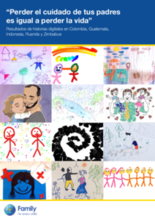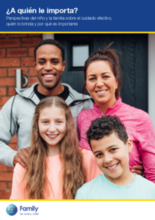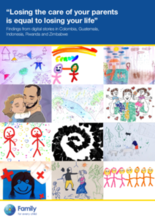Displaying 111 - 120 of 345
As part of a 3‐year US federal project of family group conferences (FGCs) in one jurisdiction, this study collected fidelity data from professional and family member participants of FGCs, including children and young people. Descriptive data from a small sample of child and young people participating in FGC suggest differences in their perspectives regarding family empowerment, transparency, and inclusion in decision making, when compared with the perspectives of other family members and professionals for whom data are available.
There is extensive research demonstrating clearly the importance of a safe and caring family for child wellbeing and development. While there is consensus on the importance of effective care in families for children, there is a lack of discussion and agreement about the precise components of this care. This report contributes to debates on the components of family care by providing perspectives from nearly 200 children and over 80 adults from Brazil, Colombia, Egypt, Mexico, Russia, Rwanda and Zimbabwe. The report demonstrates that there are many commonalities in perspectives on and experiences of care across contexts.
Pese a que hay un consenso sobre la importancia del cuidado efectivo en las familias para los niños, existe una falta de discusión y acuerdo sobre los componentes precisos de este cuidado. Este informe contribuye a debatir sobre este importante tema al proporcionar perspectivas de los grupos focales con 198 niños y 81 adultos de Brasil, Colombia, Egipto, México, Rusia, Ruanda y Zimbabue.
This report explores what family means to children and adults in five countries using the digital storytelling technique.
In order to address the need for evidence-based research about the care leaver experience, a study was facilitated by the Uganda Care Leavers project - sponsored by Alternative Care Initiatives (ACI), a Ugandan NGO, and BULA, a U.S. 501(c)(3) non-profit organization - to conduct peer-led participatory workshops throughout the country. These care leavers, identified by local community leaders and networks, were invited to participate in workshops where they completed surveys about their experiences, the results of which are presented in this report. Survey results are the basis of this study’s recommendations and suggestions for future care reform.
In this study, the authors surveyed one hundred 4- to 11-year-olds removed from home because of maltreatment about their placement preferences. These results suggest that young children may express more mature preferences than recognized by the law, and that there may be value in asking even relatively young children about with whom they would like to live following removal from home as a result of maltreatment.
This paper examines the use of Family Group Conferences (FGCs) in engaging with looked after children.
This study explores understandings of children and childhood among 21 social workers from five child protection services in Chile.
This chapter from the book Re-Visioning Public Health Approaches for Protecting Children, drawing on recent international empirical research, illustrates the perspectives of key stakeholders in the child welfare and protection services: Children, caregivers and practitioners. It shows that while there is an awareness of what children and families require in order to lead supported and healthy lives, the current system is challenged in its attempts to adequately address their needs due to its forensic and highly regulated orientation.





